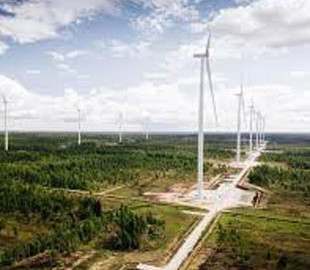Estonia is concerned that offshore wind farms are reducing the country's defense capabilities


The Estonian military has raised the issue of the risks of building offshore wind farms in the Gulf of Riga, as they interfere with military monitoring of the area.
This, according to “European Truth”, is reported by ERR.
Wind power generators interfere with the operation of military radars, creating very strong interference and “stunning” the Defense Forces. The required signal is distorted or reflected from the working blades of wind turbines.
“If we are talking about the worst-case scenario, about a military attack against Estonia, then the early warning time in the event of the approach of missiles on missile carriers or missiles launched from aircraft will be reduced, because we may not notice the take-off and maneuvers of aircraft before the missiles are launched. We are talking about minutes or even tens of minutes of time that we could lose,” – said Ants Kiviselg, head of the Defence Forces Intelligence Centre.
In cooperation with the Defence Forces, entrepreneurs and the Ministry of Defence, compensation mechanisms have been developed on how to build wind farms in a way that reduces their impact on security.
However, according to the head of the Estonian Navy, the wind farms planned in the Gulf of Riga are far from contributing to the security of not only Estonia, but also other NATO members.
“Offshore wind farms have a very strong impact on the operation of military monitoring systems. These are not only our naval radars located on the shore. These are also passive detection systems, electronic reconnaissance systems, acoustic systems, and they also affect the use of naval weapons”, – said the Commander-in-Chief of the Naval Forces Ivo Vyark.
The Swedish government has banned the construction of wind farms in an area that is within the orbit of military interests and is a territory related to security.
“I can say that everything that was said in Sweden is very adequate. I share the opinion of my Swedish colleagues, because the environment in which we have to operate today, this entire naval doctrine and the enemy in general, are the same. That is why I share their opinion that offshore wind farms contain security risks,” – said Värk.
“If there is a threat there, then we will review it. And if these compensatory measures do not work or do not help, then, of course, something needs to be changed. But again, today the measures that have been taken: the Kipu peninsula, the new radar, the new radar in Ida-Virumaa, passive radars on the coast, – those measures were developed together with these agencies, which today say that this is not enough,” – said Defense Minister Hanno Pevkur.
The military did not dare to say this out loud for a long time, but the Swedish decision pushed them. The Swedish government recently rejected applications to build 13 offshore wind farms in the Baltic Sea due to the risk to the country's defense in the event of attacks from Russia.
Sweden and Norway have also been reported to be abandoning plans to create completely cashless systems due to concerns that this would increase their vulnerability to threats from Russia.
Recent Posts
Iwona Pavlović sharply reviewed the performance of Magdalena Narożna. Rafał Maserak stood up in defense of the singer
Iwona Pavlović did not leave a dry thread on Magdalena Narożna. < img src =…
European developers will create the first interceptor of hypersonic weapons in the Earth's atmosphere
< IMG SRC = "/Uploads/Blogs/86/2F/IB-FRCAQ2T_0DF4A499.jpg" ALT = "European Developers will create the first interceptor of…
The specifications of American intercontinental ballistic missiles Sentinel are disclosed
< IMG SRC = "/Uploads/Blogs/E7/94/IB-FRCMGIRJA_2A6BB1CB.jpg" Alt = "The technical characteristics of American intercontinental ballistic missiles…
Dangerous QR codes-how do you not lose money in transport
< IMG SRC = "/Uploads/Blogs/84/E3/IB-FRC7AAK97_5E5E5EEB20.jpg" Alt = "Dangerous QR Codes-How not to lose money in…
In China, 34 people received prison terms for cryptoshachra at $ 64 million
< img src = "/uploads/blogs/27/54/IB-FRC31LBR_8F0548AC.jpg" Alt = "in China 34 people received prison terms for…
17 things you didn't know what your iPhone smartphone could do
< img src = "/uploads/blogs/02/52/IB-FRC31B1B1B1bs_fc931624.jpg" Alt = "17 things you did not know that your…